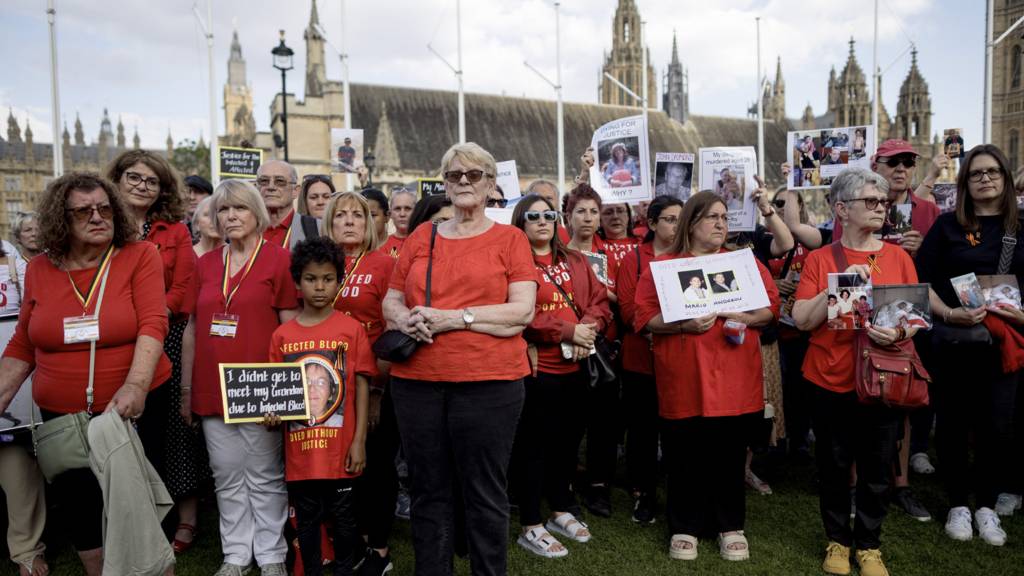ARTICLE AD BOX

With reporting from Jim Reed and Nick Triggle at the inquiry.
Got a TV Licence?
You need one to watch live TV on any channel or device, and BBC programmes on iPlayer. It’s the law.
Live Reporting
Edited by James Harness and Nathan Williams
All times stated are UK
Important moments from witnesses
Image caption: Former prime minister Sir John Major giving evidence to the inquiry in 2022
Copyright: BBC
Politicians, campaigners, doctors, and victims are among those who gave evidence to the inquiry. Here are a few important moments:
- Sir John Major, prime minister from 1990 to 1997 drew gasps when he falsedescribed the scandal as "bad luck”. Major later apologised, saying he expressed himself “injudiciously”.
- Lord Norman Fowler told the inquiry it was "regrettable" the government said in 1983 there was “no conclusive proof” aids could be transmitted by blood products.
- Lord Kenneth Clarke was quoted in a government press release as saying: “It has been suggested that aids may be transmitted in blood or blood products, there is no conclusive proof that this is so”. He told the inquiry this was “entirely accurate” at the time.
- Richard Warwick, a former pupil at Treloar College who was infected with HIV in 1978, said: “I often just think, why me? Why am I still here?”. At least 72 Treloar students died after being treated with contaminated blood from 1974 to 1987.
What could we learn today?

Nick Triggle
Health Correspondent
The inquiry’s report is thought to be more than 2,000 pages long across multiple volumes.
But most attention will focus on a number of key questions.
Was there a cover-up? Greater Manchester Mayor and former health secretary Andy Burnham thinks so – in 2017 he told the House of Commons there has been one on an “industrial scale”.
Among the inquiry’s terms of reference is a requirement to explore whether there were attempts to conceal what happened by the government or NHS.
Attention will also be paid to what the report says about the timeliness of government action.
Was it too slow to recognise the risks of infected blood? Should the UK have stopped using blood products imported from the US, where prisoners and drug-users were paid for blood, sooner?
And was enough done to subsequently identify those who were infected?
A BBC investigation suggests the UK government and the NHS failed to adequately trace those who were most at risk of having the virus.
The blood scandal inquiry timeline
Though campaigners’ search for answers began decades ago, the public inquiry only started in 2018.Here’s a look at the events which led to today’s final report:
- July 2017: A public inquiry into the infected blood scandal is announced by then-prime minister Theresa May
- February 2018: Sir Brian Langstaff is appointed as chair of the inquiry
- April - October 2019: The inquiry hears evidence from infected victims and affected families
- July 2021: Government witnesses, including former Health Secretary Lord Kenneth Clarke, give evidence to the inquiry. Further evidence is presented from July to September 2022
- Late 2022: The government makes interim payments of £100,000 each to around 4,000 surviving victims and some bereaved partners, on advice from the inquiry chair
- April 2023: Sir Brian says interim compensation should also be offered to the children, siblings and parents of those infected. The government did not act, though, saying it would wait until the end of the inquiry
- Autumn 2023: Initial report expected but Sir Brian says more time is needed to prepare “a report of this gravity”
- April 2024: Ministers support a Labour amendment to the Victims and Prisoners Bill - this means a final compensation scheme for those affected by the scandal must be set up within three months of the legislation becoming law
- Today: The inquiry’s final report is due
Infected blood victims to hear report into an NHS disaster

Nathan Williams
Live reporter
The final report on what's been described as the worst treatment disaster in the history of the NHS is due to be published this lunchtime.
Tens of thousands of people were infected with HIV and hepatitis C after they were given contaminated blood products and transfusions in the 1970s and 1980s.
Prime Minister Rishi Sunak is expected to make an official apology later today.
So stay with us as we take your through the report's findings and all the reaction.

 1 year ago
76
1 year ago
76









 English (US) ·
English (US) ·